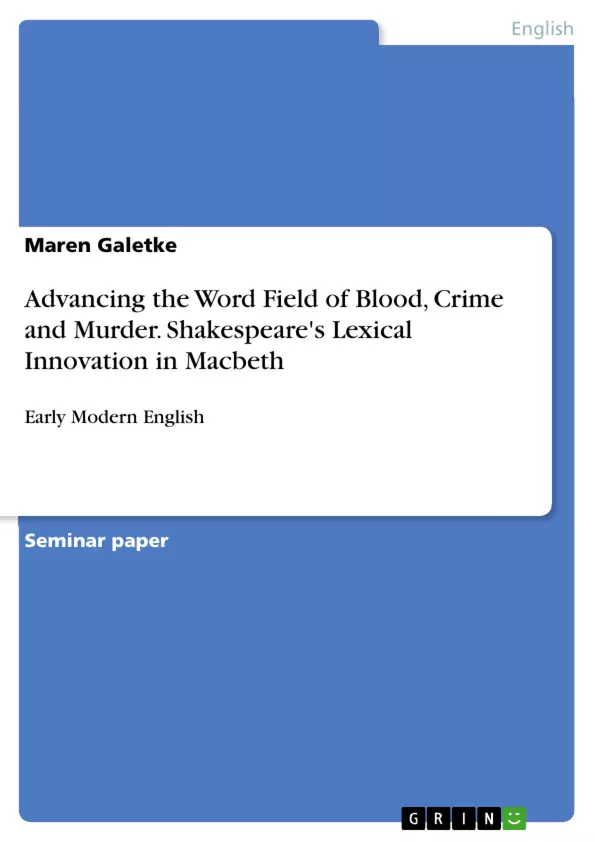The term paper provides a linguistic analysis of Shakespeare's coinages, based on the example of Macbeth. The analysis will focus on his three major word formation strategies: compounding, derivation and conversion.
When dealing with language in the Early Modern English period, there is hardly any way around the exploration of Shakespeare's works and his innovative lexical creativity. Not only is Shakespeare known for being one of the most productive writers of his time, he is also responsible for coining a number of lexical variations that still stick with us today. His gift for elevating the ordinary through lexical innovation and rhetoric ingenuity is the reason why his reputation as a pioneer of English literature and language remains unchallenged today.
Inhaltsverzeichnis (Table of Contents)
- Introduction
- Lexis in the Early Modern English period
- The expanding lexicon
- Shakespeare and the OED
- Word formation in Macbeth
- Compounding
- Derivation
- Conversion
- Neologisms in the word field of blood, crime and murder
- Conclusion
Zielsetzung und Themenschwerpunkte (Objectives and Key Themes)
This paper aims to analyze Shakespeare's linguistic innovations in Macbeth, focusing on the patterns he used to create linguistic variety, the meaning and effect of his invented expressions, and their contribution to the play's central theme of blood, crime, and murder.
- The role of Shakespeare in the expansion of the English lexicon during the Early Modern English period
- The process of word formation in Macbeth, focusing on compounding, derivation, and conversion
- The function of Shakespeare's lexical inventions in creating atmosphere, setting, and advancing the central theme of the play
- The influence of Shakespeare's work on the development of the English language
- The historical context and factors influencing lexical innovation in Shakespearean plays
Zusammenfassung der Kapitel (Chapter Summaries)
- Introduction: This chapter introduces the topic of Shakespeare's lexical creativity and provides an overview of the paper's objectives and scope. It focuses on Shakespeare's role as a pioneer of English literature and language, highlighting his innovative use of language in Macbeth. The chapter establishes the play's tragic theme of murder and the importance of analyzing Shakespeare's coinages in relation to this theme.
- Lexis in the Early Modern English period: This chapter delves into the historical context of the Early Modern English period, examining the factors that led to the expansion of the English lexicon. It explores the role of the printing press, the Reformation, and the influence of classical languages like Latin. The chapter also discusses the impact of loan words and the importance of word-formation processes like compounding, affixation, and conversion.
- The expanding lexicon: This chapter focuses on the specific aspects of the expanding lexicon during the Early Modern English period. It examines the statistical data that demonstrates the rapid growth of the English vocabulary, highlighting the peak of this growth during the years 1570 to 1630. The chapter explores the influence of Latin loan words, the emergence of technical terms, and the evolving attitudes towards English as a language.
- Shakespeare and the OED: This chapter discusses Shakespeare's role in contributing to the development of the English language and his representation in the Oxford English Dictionary. It addresses the controversy surrounding the number of Shakespearean neologisms, highlighting different estimations from various sources. The chapter provides a brief overview of Shakespeare's prolific use of semantic change and word-formation processes.
- Word formation in Macbeth: This chapter delves into Shakespeare's use of word-formation strategies in Macbeth. It provides an in-depth analysis of compounding, derivation, and conversion as employed by Shakespeare to create new expressions and enrich the play's language.
Schlüsselwörter (Keywords)
This study examines Shakespeare's lexical creativity in Macbeth, focusing on neologisms, word formation, the Early Modern English period, and the influence of Shakespeare on the English lexicon. The paper analyzes Shakespeare's use of compounding, derivation, and conversion, exploring the relationship between these strategies and the play's themes of blood, crime, and murder. The analysis sheds light on the historical context of English language development and the role of Shakespeare as a pivotal figure in shaping the language.
Frequently Asked Questions
What are Shakespeare's primary word formation strategies analyzed in this paper?
The analysis focuses on three major strategies: compounding, derivation, and conversion.
How did Macbeth contribute to the English word field of crime?
Shakespeare used Macbeth to coin numerous neologisms specifically related to the themes of blood, crime, and murder to create a darker atmosphere.
Why was the Early Modern English period significant for the lexicon?
This period saw a rapid expansion of the English vocabulary (peaking between 1570-1630) due to the printing press, the Reformation, and classical influences.
What is the relationship between Shakespeare and the Oxford English Dictionary (OED)?
Shakespeare is one of the most cited authors in the OED, though there is ongoing debate about the exact number of words he actually invented versus those he first recorded.
What is "conversion" in Shakespearean linguistics?
Conversion is a word-formation process where a word changes its grammatical category (e.g., a noun becoming a verb) without changing its form.
- Arbeit zitieren
- Maren Galetke (Autor:in), 2020, Advancing the Word Field of Blood, Crime and Murder. Shakespeare's Lexical Innovation in Macbeth, München, GRIN Verlag, https://www.grin.com/document/1185296



